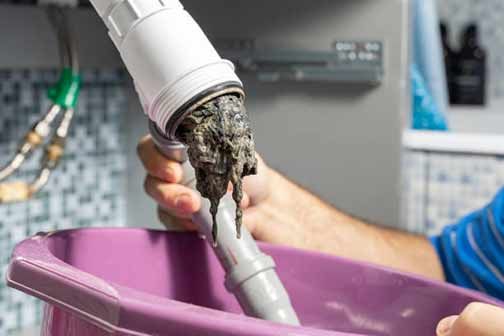Causes of Clogged Drains and How to Avoid Them

Clogged drains can be a homeowner’s nightmare, leading to unpleasant odors, slow drainage, and potentially costly repairs. Understanding the common causes of clogged drains—and how to avoid them—is essential for maintaining a functional plumbing system. In this comprehensive guide, we’ll explore the top culprits behind clogged drains and provide actionable tips to keep your pipes clear and your home running smoothly.
Understanding Drain Clogs
A drain clog occurs when materials build up in the pipes, restricting water flow. While minor clogs can often be resolved with simple home remedies, persistent clogs may indicate deeper issues requiring professional intervention. Understanding what causes these clogs can help homeowners take proactive measures to prevent them.
Top Causes of Clogged Drains
1. Hair
Hair is one of the leading causes of clogged drains, particularly in bathroom sinks and showers. When hair accumulates, it can form a dense mass that traps other debris, leading to severe blockages.
Prevention Tip: Use a hair catcher or drain cover to trap hair before it enters the drain. Regularly clean these devices to keep your drains clear.
2. Food Waste
In kitchens, food waste is a common culprit of clogs. Even with garbage disposals, certain food items can lead to buildup in pipes.
Prevention Tip: Dispose of food waste in compost or trash rather than down the drain. Avoid putting fibrous foods, coffee grounds, and starchy items into the disposal.
3. Soap Scum
Soap scum is a residue formed from the combination of soap and minerals in hard water. Over time, it can build up in pipes and fixtures, leading to slow drainage.
Prevention Tip: Use liquid soap instead of bar soap, as it tends to create less buildup. Regularly clean your sinks and tubs to prevent soap scum from hardening.
4. Grease and Oil
Cooking oils and grease can solidify in your pipes, creating significant clogs. When poured down the drain, they can stick to the sides of the pipes and trap other debris.
Prevention Tip: Collect grease in a container and dispose of it in the trash. Consider using paper towels to wipe greasy pans before washing them.
5. Foreign Objects
Accidentally dropping foreign objects down the drain can lead to immediate clogs. This includes anything from toys to jewelry.
Prevention Tip: Educate family members about what can and cannot go down the drain. Use drain covers to prevent objects from falling in.
6. Tree Roots
Tree roots can invade underground pipes, especially if there are cracks or leaks. This can lead to serious clogs and potential pipe damage.
Prevention Tip: Maintain your yard and regularly inspect trees near your plumbing. Consider using root barriers to prevent roots from growing into your pipes.
7. Mineral Buildup
In areas with hard water, mineral deposits can accumulate in pipes over time, reducing water flow and leading to clogs.
Prevention Tip: Install a water softener to reduce mineral content in your water, helping to prevent buildup in pipes.
Preventive Measures to Avoid Clogged Drains
Implementing preventive measures is key to avoiding the frustrations of clogged drains. Here are practical strategies you can use:
1. Hair Catchers
Install hair catchers in your shower and sink drains. These simple devices can save you time and trouble by catching hair before it enters the pipes.
2. Proper Disposal of Food Waste
Be mindful of what you put down your kitchen sink. Always use the garbage disposal responsibly, and avoid sending fibrous or starchy food down the drain.
3. Regular Cleaning
Regularly clean your drains using a mixture of baking soda and vinegar to break down buildup. This natural solution can keep your pipes clear without harsh chemicals.
4. Avoiding Grease Disposal
Never pour grease down the drain. Instead, allow it to cool and dispose of it in the trash.
5. Mindful Usage of Toilets
Only flush toilet paper and human waste. Avoid flushing feminine products, wipes, or any non-biodegradable items.
6. Root Barriers
If you have trees near your plumbing, consider installing root barriers. This can help prevent tree roots from invading your pipes and causing clogs.
Signs of Clogged Drains
Being aware of the signs of clogged drains can help you address issues before they escalate. Look out for:
- Slow draining sinks or tubs
- Unpleasant odors from drains
- Gurgling sounds when using sinks or toilets
- Water pooling around fixtures
If you notice any of these signs, it may be time to take action.
What to Do if You Have a Clogged Drain
If you find yourself facing a clogged drain, here are steps you can take:
- Try a Plunger: For minor clogs, a plunger can often do the trick. Make sure to create a good seal and use forceful pushes to clear the blockage.
- Use a Drain Snake: If plunging doesn’t work, a drain snake can help reach deeper clogs. Insert it into the drain and twist to break up the blockage.
- Homemade Remedies: Pouring a mixture of baking soda and vinegar can help dissolve certain types of clogs. Follow it with hot water to flush the drain.
- Call a Professional: If the clog persists, or if you suspect a more serious issue (like tree root invasion), it’s best to call a professional plumber for assistance.
Frequently Asked Questions
It’s a good idea to clean your drains every few months, or more frequently if you notice slow drainage.
While chemical cleaners can be effective, they can also damage pipes over time. It’s best to use natural remedies or consult a professional.
Gurgling sounds can indicate a clog or venting issue. It’s advisable to check for clogs or call a plumber if the problem persists.
Yes, avoid fibrous vegetables (like celery), starchy foods (like potatoes), and anything greasy to prevent clogs.
Don’t let clogged drains disrupt your home life! For professional plumbing services, advice, and solutions, contact us at iFix Plumbing & Drains – Plumber Richmond Hill today. Our expert team is here to help you maintain clear and functional drains year-round.
